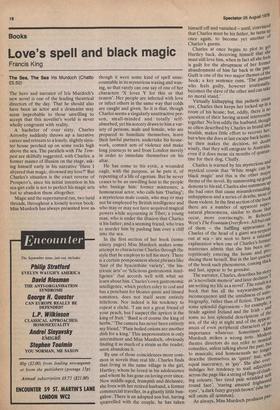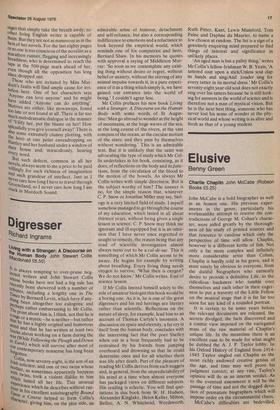Books
Love's spell and black magic
Francis King
The Sea, The Sea Iris Murdoch (Chatto £5.50) The hero and narrator of Iris Murdoch's new novel is one of the leading theatrical directors of the day. That he should also have been an actor and a dramatist may seem improbable to those unwilling to accept that this novelist's world is never wholly congruent with reality.
A bachelor of over sixty, Charles Arrowby suddenly throws up a lucrative career and retreats to a lonely, slightly sinister house perched up on some rocks high above the sea. The parallels with The Tempest are skilfully suggested, with Charles, a former master of illusion on the stage, asking himself early in his narrative 'Have I abjured that magic, drowned my love?' But Charles's situation is the exact reverse of Prospero's, since his initial intention in his sea-girt exile is not to perfect his magic arts but to abandon them altogether.
Magic and the supernatural run, two lurid threads, throughout a loosely woven book. Miss Murdoch has always presented love as though it were some kind of spell unaccountable in its mysterious waxing and waning, so that rarely can one say of one of her characters 'X loves Y for this or that reason'. Her people are infected with love or infect others in the same way that colds are caught and given. So it is that, though Charles seems a singularly unattractive person', small-minded and totally selfabsorbed, yet his sorcery draws to him a variety of persons, male and female, who are prepared to humiliate themselves, leave their lawful partners, undertake his housework, commit acts of violence and make long journeys to and from London merely' in order to immolate themselves on his altar.
He has come to his eyrie, a wounded eagle, with the purpose, as he puts it, of repenting of a life of egotism. But he never ceases to be an unwilling host to the people who besiege him: former mistresses; a homosexual actor, who calls him 'Darling'; a mysterious male cousin, who may or may not be employed by British intelligence and who may or may not have acquired magical powers while sojourning in Tibet; a young man, who is under the illusion that Charles is his father; and a seeming friend, who tries to murder him by pushing him over a cliff into the sea.
In the first section of her book (some ninety pages) Miss Murdoch makes some attempt to characterise Charles through the style that he employs to tell his story. There is a certain pompousness about phrases like 'hair of the hyacinthine variety', 'the histrionic arts' or 'felicitous gastronomic intelligence' that accords well with what we learn about him. Charles's own gastronomic intelligence, which prefers coley to cod and has a penchant for bloater-paste and tinned tomatoes, does not itself seem entirely felicitous. Nor indeed is his tendency to repeat a cliché. 'I am not a great friend of your peach, but I suspect the apricot is the king of fruit.' Basil is of course the king of herbs.' The camera has never been entirely my friend.' Plain boiled onions are another dish for a king.' This impersonation is only intermittent and Miss Murdoch, obviously finding it as much of a strain as the reader, soon abandons it.
By one of those coincidences more common in novels than real life, Charles finds that living in the same village is the girl, Hartley, whom he loved in his adolescence and whom he has gone on loving ever since. Now middle-aged, frumpish and declassee, she lives with her retired husband, a former commercial traveller, in a ghastly little bungalow. There is an adopted son but, having quarrelled with the couple, he has taken
Spectator 26 August 1918 himself off and vanished — until, convinced that Charles must be his father, he turns UP once again, to become yet another °f Charles's guests. Charles at once begins to plot to get Hartley back, deceiving himself that she must still love him, when in fact all she feels is guilt for the abruptness of her former abandonment of him far back in the past. Guilt is one of the two major themes of the book; a key sentence runs, ,The partner who feels guilty, however irrationallY' becomes the slave of the other and can take no moral stand.' Virtually kidnapping this pathetic creature, Charles then keeps her locked UP in a room of his house; but, oddly, there is rt° question of their having sexual intercourse together. No less oddly the husband, though so often described by Charles as brutal and brutish, makes little effort to recover her; but when she does at last escape back home, he then makes the decision, no doubt wisely, that they dog, Chuffy.
will emigrate to Australia, even if it does mean six months of quara
tine for their nCharles is warned by his mysterious and mystical cousin that 'White magic can be black magic' and this is the other major theme of the novel. By summoning up good demons to his aid, Charles also summons UP the bad ones that cause misunderstanding', unhappiness and a series of deaths, most them violent. In the first section of the Wit there are a number of apparent supernatural phenomena, similar to those that occur, more convincingly, in Rebecca West's The Fountain Overflows. All but one of them — the baffling appearance Mt Charles of the head of a giant sea-serPea, out at sea — are seen to have a rational explanation when one of Charles's former mistresses admits that she has been Stirreptitiously entering the house and Producing them herself. But in the last quarter c the sea, the book such phenomena, coming thic and fast, appear to be genuine. The narrator, Charles, describes his story, as 'a novelistic memoir' and later declares am writing my life as a novel'. The result i.s a book that has all the waywardness, the inconsequence and the untidiness of autobiography, rather than of fiction. There area tirade against Ireland and the Irish — and some splendid digressions — for examPle' d some no less splendid descriptions of tu'e sea, of the sky at night and of the aPPear_ ances of even peripheral characters of n.sus importance whatever. Sometimes !vitro Murdoch strikes a wrong note. Mode theatre directors do not refer to Musteut comedies, unless talking about the paste ,, to musicals; and homosexuals no lo0t`. equal inaccuracy, as 'gay'. She also e describe themselves as 'queer' but, vit.tr".. indulges her tendency to trail adjeca (3.tv'ves across the page like a string of flags of clasps* s ing colours: 'her tired pale wrinkled round face', 'staring amazed frighte.neeru, eyes', 'a dark fuzzy greyish brown' (site b self omits all commas).
As always, Miss Murdoch produces Pas
sages that simply take the breath away; no . Other living English writer is capable of them. But they are not as numerous as in the
best of her novels. For the last eighty pages or so one is too conscious of the novelist as a Marathon runner, flagging and increasingly breathless, who is determined to reach the tape at the 500-page mark ahead of her, even though all the opposition has long since dropped out. Those who are irritated by Miss Mur
doch's faults will find ample cause for irritation here. One of her characters says Anyone can love anyone' and he might have added 'Anyone can do anything'. Motives are either, like stowaways, found tO0 late or not found at all. There is far too much melodramatic dialogue in the manner of 'Vilify her, put the blame on her! How sPlendidly you give yourself away!' There is also some extremely clumsy plotting, with the hero at one point eavesdropping on Hartley and her husband under a window of their house and, miraculously, hearing every word.
But such defects, common in all her
novels, always seem to me a price to be paid Willingly for such richness of imagination and such grandeur of intellect. Just as I never care how long I have to travel through -Treeneland, so I never care how long I am stuck in Murdoch Sound.































 Previous page
Previous page